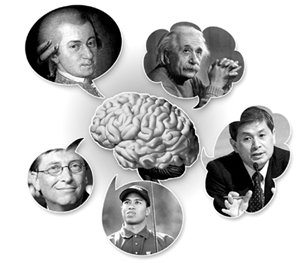Is Korea a place for the gifted children?
RECENTLY, A seven year-old boy was featured on an article in that he could solve calculus problems all by himself. It took only seven months for him to solve it after he learned how to multiply. Outstanding in Math and Science, he is now taught by a professor in Inha Univ., demonstrating ability as great as university students. He has also been admitted to Busan Science Academy and will take courses from next semester. Depending on how he grows up, he can either become a second Einstein or just another "grown up". Is Korea a place for the former or the latter?
Gifted children possess outstanding abilities in particular areas of expertise. They show high levels of curiosity in usual phenomenon, and immerse themselves in specific fields. Creative, collective and structural thinking is what makes them distinguishable from others. These so called "gifted children" in Korea represented only 0.3% of all students until now. Compared to America, which manages 1% to 15% students as talented, the range is apparently limited. However, a law was passed in 2002 to expand the range to 5% starting from next year. It also involves a plan to establish schools with specific fields other than science and technology. Although it is improving a lot, the situation is not getting any better for the minority group of gifted children in Korea.
Disbelief in education for the talented, causes an increasing number of gifted students to seek opportunities abroad. "Hardly anyone think of studying in Korea. Most of the students plan to go abroad for advanced studies. It is a much more likely trend, nowadays," says Bae Whee-dong, senior student of Busan Science Academy. It is mostly caused by a lack of basic education programs for talented students in Korea. For example, in Israel, the government manages 12 different academies for the gifted, offering 200 various subjects. However, in Korea, the government does not collectively manage institutions for the gifted. In order to develop their full potential, predominant students have to go abroad rather than staying in Korea.
Moreover, some of the talented students in Korea lose their specialties and live general lives. Many student geniuses have a hard time conforming to the current public education system, but standardized education forces them to fit into the average, ignoring their unique differences. Once identified as a genius in the 1960s, a boy who was four years old was in the Guinness Book of World Records having the highest IQ in the world at that time. However, 40 years have passed now, but he is no more different than others. Many gifted students, who are talented by nature, can become general when their abilities are not developed adequately; which is a big national loss. 
▲ The second Einstein is possible in Korea?
Complex reasons contribute to the gifted students' inevitable situation within Korean society. "The biggest problem is that law for the gifted is not flexible enough. Considering the difference, education for gifted students should be applied flexibly and treated case-by-case," says Synn Myung-hi, Prof. of Dept. of Education. Right now they are grouped by the fact that they are different from others even though each talented student possesses unique abilities.
Apart from the problems caused by the education system, a conscious change in equalization is required the most. "Korean people commonly have uncomfortable feelings toward uniqueness. It is a national sentiment of Koreans that they exclude something when it is out of the norm," says Synn. These propensities cause misunderstandings in the concept of "equality". "Equality means not only admitting the difference but also treating it differently. When they require average levels for outstanding students, it is not being equal; it is actually the most unequal situation for them," Synn continues. Narrow-minded recognition of people makes it difficult for gifted children to adapt in public schools.
Education for the gifted, however, is still developing in Korea. Thus, rather than saying it is a "problem", it should be treated as a "possibility". To make it possible, financial support from the government is necessary. Various kinds of education opportunities should be established, and each field should be supported with teachers who take full charge of the education curriculum. Further, without a change in consciousness towards gifted children, a better environment for gifted students will remain as a possibility only.
"Gifted children are influential enough to change the culture and the history of mankind," says Prof. Synn. It is the 20% who leads the other 80%. Our government and each individual should pay more attention to the gifted 20%. It is time to become aware of where international competitiveness originates.

